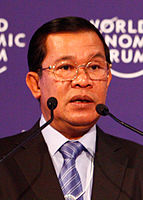Cambodian Constituent Assembly election, 1993
|
|
||||||||||||||||||||||||||||||||||||||||
|---|---|---|---|---|---|---|---|---|---|---|---|---|---|---|---|---|---|---|---|---|---|---|---|---|---|---|---|---|---|---|---|---|---|---|---|---|---|---|---|---|
|
||||||||||||||||||||||||||||||||||||||||
|
All 120 seats to the National Assembly 61 seats needed for a majority |
||||||||||||||||||||||||||||||||||||||||
| Registered | 4,764,618 | |||||||||||||||||||||||||||||||||||||||
| Turnout | 4,267,192 (89.6%) | |||||||||||||||||||||||||||||||||||||||
|
||||||||||||||||||||||||||||||||||||||||

Composition of the first National Assembly of Cambodia.
|
||||||||||||||||||||||||||||||||||||||||
|
||||||||||||||||||||||||||||||||||||||||
A general election was held in Cambodia between 23 and 28 May 1993. The result was a hung parliament with the Funcinpec Party being the largest party with 58 seats. Voter turnout was 89.56%. The election was conducted by the United Nations Transitional Authority in Cambodia (UNTAC), which also maintained peacekeeping troops in Cambodia throughout the election and the period after it.
This remains the last election which was won by a party other than the Cambodian People's Party as the CPP began to dominate Cambodian politics from 1998.
The State of Cambodia (SOC) and three warring factions of the Cambodian resistance consisting of FUNCINPEC, Khmer Rouge and Khmer People's National Liberation Front (KPNLF) signed the Paris Peace Accords in October 1991. The accords provides for the establishment of the UNTAC, a United Nations-led interim administration that would supervise the demobilization of troops from the SOC and the three warring factions, and also conduct democratic elections 1993. The UNTAC was formed at the end of February 1992, and Yasushi Akashi was appointed as head of the UNTAC.
In August 1992, the UNTAC administration promulgated the election law, and conducted the provisional registration of political parties. Political parties that were registered were allowed to open party offices the following month. The following year in January 1993, registration of electorate was carried out, and UNTAC identity cards were issued. The UNTAC conducted a civic edication campaign in February 1993, and two months later the UNTAC allowed political parties to hold public meetings and rallies to campaign for votes.
...
Wikipedia


